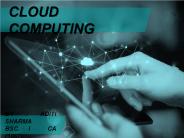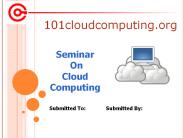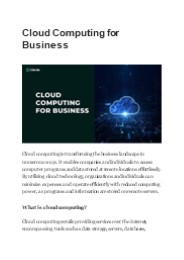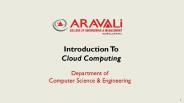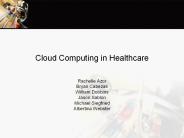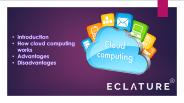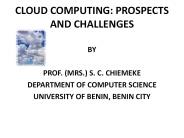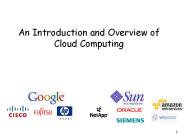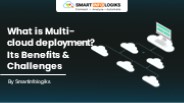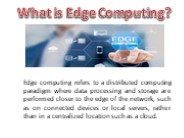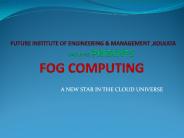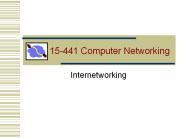Disadvantages Of Cloud Computing PowerPoint PPT Presentations
All Time
Recommended
https://medium.com/@bestdelhicloudcomputingcourse/g-cloud-computing-vs-traditional-computing-aff7f3fd9cad Cloud computing and traditional computing represent two distinct approaches to meet the computational needs of businesses and individuals. While traditional computing offers control and security, cloud computing provides cost efficiency, scalability, and accessibility. Understanding the differences between these approaches can help organizations make informed decisions about their computing infrastructure. Ultimately, the choice between cloud computing and traditional computing depends on factors such as cost, security requirements, and scalability needs.
| PowerPoint PPT presentation | free to download
Cloud computing is the process of storing, accessing, and managing large amounts of data and software programs through the internet. Because the program and data are stored in global data centers, you can utilize it without using your computer’s hard disc.
| PowerPoint PPT presentation | free to download
Are you searching for the best Advantages and Disadvantages of Cloud Computing? Look no further! Check out this presentation as in this presentation you will get to know every detail of the Best Advantages and Disadvantages of Cloud Computing. Career prospects, Job Opportunities and roles and much more.
| PowerPoint PPT presentation | free to download
... compute infrastructure capable of hosting end-customer applications and billed by consumption' ... that Amazon uses for its e-commerce Web sites. ...
| PowerPoint PPT presentation | free to view
Greens Technology provides AWS training in Chennai to professionals and corporates with Certification and Placements. We offer real-world AWS Course in Chennai. For details call us at 89399-15577 or walk into our AWS Training Center in Adyar, OMR, Velachery, Tambaram, Anna Nagar.
| PowerPoint PPT presentation | free to download
ITEC0724 Modern Related Technology on Mobile D. : Cloud Deployment Model + Migration and Mobile Cloud Computing Lecture Notes #2 * ...
| PowerPoint PPT presentation | free to view
Cloud computing ppt All the benefits
| PowerPoint PPT presentation | free to download
concept of cloud computing
| PowerPoint PPT presentation | free to download
cloud computing provides a variety of computing resources , from servers and storage to enterprise applications such as email, security, backup/DR, voice, all delivered over the Internet
| PowerPoint PPT presentation | free to download
Cloud computing is Internet-based computing, whereby shared resources, software, and information are provided to computers and other devices on demand, like the electricity grid.
| PowerPoint PPT presentation | free to download
"Experience the transformative power of cloud computing with seamless access to remote computer programs and data. This innovative technology empowers businesses and individuals to streamline operations, minimize costs, and enhance efficiency by storing information on secure remote servers, revolutionizing the way we work and collaborate."
| PowerPoint PPT presentation | free to download
Rather than owning their own computing infrastructure or data centers, companies can rent access to anything from applications to storage from a cloud service provider. https://www.acem.edu.in/
| PowerPoint PPT presentation | free to download
Cloud computing offers substantial benefits to any business, for start-up businesses the cloud offers an essential differentiator. If you would like to find out more about cloud computing advantages and disadvantages we are here to help. https://defintel.com/
| PowerPoint PPT presentation | free to download
Introduction to Cloud Computing In order to understand Cloud Computing in the healthcare ... thru IT India & Japan Forefront Canada & China Lackadaisical ...
| PowerPoint PPT presentation | free to download
Eclature Technologies provides a large selection of cloud services you can use for storing, managing and processing data and applications.
| PowerPoint PPT presentation | free to download
Cloud Computing Cloud Computing defined Dynamically scalable, device-independent and task-centric computing resources are provided online, with all charges being on a ...
| PowerPoint PPT presentation | free to download
CLOUD COMPUT NG Project : A Simple Application with Hadoop BR ENF NTRODUCT ON Typical cloud computing providers deliver common business applications online which ...
| PowerPoint PPT presentation | free to view
Lecture 15: Cloud Computing Modified from Mark Baker Advantages of Cloud Computing Universal document access: That is not a problem with cloud computing, because you ...
| PowerPoint PPT presentation | free to view
A technology known as cloud computing makes it possible to share computing, storage, and networking resources via the internet. The benefits and drawbacks of cloud computing are discussed by Danish Jafri, an expert. He illustrates how cloud computing may result in significant cost reductions, scalability, productivity improvements, and greater levels of service. Cloud computing, however, may also pose security and compliance problems.
| PowerPoint PPT presentation | free to download
The process of creating a research paper about cloud computing technology in London, UK, is referred to as "IEEE paper writing on Cloud Computing in London."
| PowerPoint PPT presentation | free to download
The term “Cloud” refers to a collection of services that are meant to offer a cost-effective solution to businesses in order to aid them in increasing their capacity and functionality with regard to their IT services. There are different Cloud Deployment Models and Cloud Service Models.
| PowerPoint PPT presentation | free to download
While using this real estate software, you can sync all of your devices together to upload your receipts, pictures, and any other documents with a click of the button to make your real estate investing easy. Through Realty Cabinet, the filing is unlimited - http://www.realtycabinet.com/
| PowerPoint PPT presentation | free to download
Jiaheng Lu Department of Computer Science Renmin University of China www.jiahenglu.net Why we use cloud computing? Why we use cloud computing? Case 1: Write a file ...
| PowerPoint PPT presentation | free to view
cloud computing: prospects and challenges by prof. (mrs.) s. c. chiemeke department of computer science university of benin, benin city
| PowerPoint PPT presentation | free to download
Jiaheng Lu Department of Computer Science Renmin University of China www.jiahenglu.net Why we use cloud computing? Why we use cloud computing? Case 1: Write a file ...
| PowerPoint PPT presentation | free to view
Jiaheng Lu Department of Computer Science Renmin University of China www.jiahenglu.net Advanced MapReduce Application Reference: Jimmy Lin http://www.umiacs.umd.edu ...
| PowerPoint PPT presentation | free to view
Mobile computing is generic technology that help to transmit of data other wireless terminals and its various Advantages, Disadvantages and Applications. http://digitalthinkerhelp.com/mobile-computing
| PowerPoint PPT presentation | free to download
Benjamin Hindman @benh what it means for devs? write your service to be run anywhere in the cluster anticipate kill -9 treat local disk like /tmp bad practices ...
| PowerPoint PPT presentation | free to download
The basics are similar, but the ... from Vmware and VPC as uses para-virtualization where the guest ... Design An Introduction and Overview of Cloud Computing ...
| PowerPoint PPT presentation | free to download
A building block for both grids and clouds. ... platform and infrastructure. Four ... How to schedule jobs efficiently to improve the resource utilization ...
| PowerPoint PPT presentation | free to view
Ravi Namboori says advisable to opt for cloud security solutions that adhere to regulations, such as PCI DSS, EU data protection laws, HIPAA, etc. learn few more things from him on security issues and conclusions on respective risks.
| PowerPoint PPT presentation | free to download
NETE4631 SOA and Cloud Computing Service Models Lecture Notes #3 * Some of the SaaS Providers Intuit Quikbooks and Quikbook online Phone and Blackberry capabilities ...
| PowerPoint PPT presentation | free to view
Cloud computing is the latest technology that is in trend to unleash a tsunami of change in our society and lives. Why Cloud computing? The article here is focused on the reasons and main advantages of cloud computing.
| PowerPoint PPT presentation | free to download
Cloud Computing is known as a model to enable easy and on-demand access to a shared group of the configurable computing resources. The concept of a cloud can be seen as a leasing or owning concept. To comprehend the cloud computing idea more clearly, joining a Cloud Computing Institute in Delhi is the best bet. for more information please visit: https://www.madridsoftwaretrainings.com/cloud-computing.php
| PowerPoint PPT presentation | free to download
Edge-Based Cloud Computing as a Feasible Network Paradigm. Joe Elizondo and Sam Palmer ... Edge-based cloud computing: new computing paradigm! Combination of two ideas ...
| PowerPoint PPT presentation | free to view
The world of cloud computing has transformed the way businesses operate. Among the newest trends is the adoption Pros and Cons of multi-cloud strategies. This approach involves utilizing services from multiple cloud providers to meet various business needs. While multi-cloud offers substantial benefits, it comes with its set of challenges. In this post, we’ll explore the ins and outs of multi-cloud strategies to provide you with a comprehensive understanding of the advantages and disadvantages.
| PowerPoint PPT presentation | free to download
Cloud computing is an internet based platform that renders various computing services like hardware, software and other computer related services remotely.
| PowerPoint PPT presentation | free to download
The Increasing Importance Of Hybrid Cloud
| PowerPoint PPT presentation | free to download
Multi-cloud deployment refers to the strategy of employing multiple cloud computing platforms or providers to host various elements of an application or system.
| PowerPoint PPT presentation | free to download
The term Cloud hosting refers to creating, manipulating, configuring and finally accessing the websites and applications online. It also provides online data storage and infrastructure to the users. Cloud hosting is the combination of hardware and software computing resources that deliver in the form of network services.
| PowerPoint PPT presentation | free to download
The term Cloud hosting refers to creating, manipulating, configuring and finally accessing the websites and applications online. It also provides online data storage and infrastructure to the users. Cloud hosting is the combination of hardware and software computing resources that deliver in the form of network services.
| PowerPoint PPT presentation | free to download
Computer Networks - 21CS52 - VTU Notes / Study Materials - Module 1
| PowerPoint PPT presentation | free to download
http://www.frevvo.com/e-forms-workflow | Hybrid clouds combine the benefits of public and private clouds while also overcoming their disadvantages. By 2016, the majority of businesses will have committed themselves to hybrid cloud technologies.
| PowerPoint PPT presentation | free to download
PARALLEL COMPUTING Reference https://computing.llnl.gov/tutorials/parallel_comp/ Parallel Programming in C with MPI and OpenMP
| PowerPoint PPT presentation | free to view
Here, we will show you about what is edge computing with its components; involving with different types of edge computing and its pros and cons with ease. This is unique content over the internet; after reading this content, you will fully understand about What is Edge Computing without getting any obstacle.
| PowerPoint PPT presentation | free to download
Businesses are turning to technology to increase their productivity and efficiency in today's world. Cloud computing and SaaS (Software as a Service) are two of the most popular business solutions for streamlining operations.
| PowerPoint PPT presentation | free to download
Cloud: Intention Of Storage Business Is A Future For Tech-Industry
| PowerPoint PPT presentation | free to download
A NEW STAR IN THE CLOUD UNIVERSE
| PowerPoint PPT presentation | free to download
Cloud computing has three most common types of cloud services to offer, namely, SaaS, PaaS and IaaS. Here we will have a brief introduction to the three cloud service types.
| PowerPoint PPT presentation | free to download
Unlock the full potential of Microsoft Azure with Ansibyte’s Azure consulting services. Our experts provide tailored strategies and solutions to optimize your cloud infrastructure and drive business success.
| PowerPoint PPT presentation | free to download
Identifier: A sequence number to identify a datagram uniquely. ... Makes it possible to break up a network in multiple subnets. ...
| PowerPoint PPT presentation | free to view
reverse mapping on the way back. destination host does not know ... Disadvantage: one lookup may take O(m), where m is number of bits (32 in the case of IPv4) ...
| PowerPoint PPT presentation | free to view
15-441 Computer Networking Internetworking
| PowerPoint PPT presentation | free to download
Cloud computing has three most common types of cloud services to offer. Depending on the needs of users, any type of cloud computing service is used either individually or in combination with others. The following is a brief introduction to the three cloud service types, namely, SaaS, PaaS and IaaS (https://www.eztalks.com/).
| PowerPoint PPT presentation | free to download







